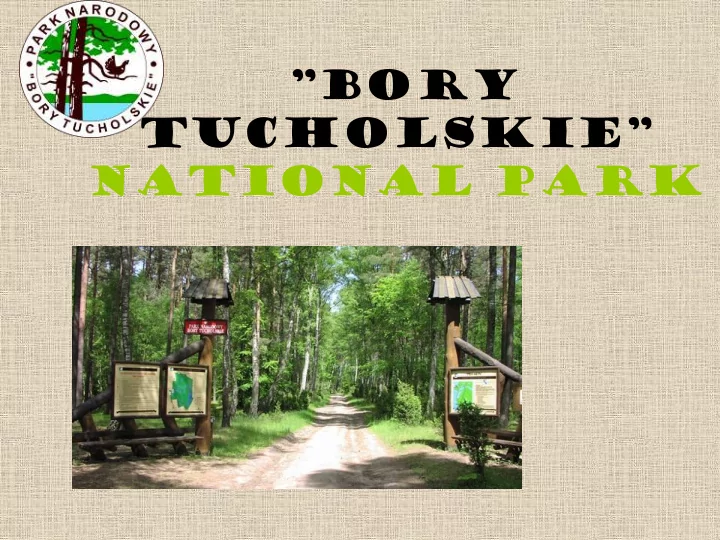

”Bory Tucholskie” National Park
Contents 1. The situation of the Park 2. Lakes 3. Angling 4. Animals 5. Flora 6. Tourist trails 7. Interesting side notes
Situation of the Park National Park „Bory Tucholskie” is situated in the Pomeranian province, near Chojnice and Brusy.
Lakes There are 21 lakes within the Park, among which Ostrowite Lake is the biggest and the deepest. Eight of them are connected and they form a stretch called Eight Lakes Stream.
Angling You can catch: pike, perch, tench, bream, chub, ide and rudd.
Animals The largest animal groups which appear are: mammals, birds, amphibians and reptiles. Mammal representatives: roe deer, deer, boar, fox, otter, badger, beaver, hare, Daubenton’s bat, shrew Bird representatives: white stork, grey heron, white-tailed eagle, eagle-owl, kingfisher, hawk, sparrowhawk, buzzard, crane, common goldeneye and bean goose Reptile representatives: blindworm, sand lizard, viviparous lizard, grass snake and common viper
Mammals Fox Badger Roe deer Hare Otter Boar
Ptaki Common Goldeneye Kingfisher White Stork White-tailed eagle Sparrowhawk Eagle-owl
Gady Blindworm Grass snake Common viper Sand lizard Vivaparous lizard
Płazy Fire-bellied toad Northern crested newt Green toad Marsh frog Moor frog Tree frog
Flora The flora of Bory Tucholskie belongs to an average-rich flora. There are 1068 species of plants. Extermely valuable elements of the Park’s flora are plants connected with so-called lobelian lakes. 98% of the Park’s forests constitutes pine forests.
Marsh forest A habitat under quite a strog influence of groundwater. The dominant plant complex of this habitat is the Pomeranian birch-oak forest. It takes up 0,1% of the forest surface.
Damp forest The habitat is fertile and favourably wet. Tree stand constitutes mainly black alder, birch and aspen. Quite luxuriant undergrowth create: hazel, dogwood and ash. It takes up 0,1% of the forest surface.
Fresh forest The habitat of fresh forest stands out from pine stand tree with a dash of silver birch. In the Park it’s the dominant habitat comprising a little more than 90% of the forest surface.
Mixed forest The habitat is medium-fertile . The species forming the tree stand upper layer are the Scots pine with the participation of the oak and the silver birch . In the Park it takes up about 0,9% of the surface.
Tourist trails There are five hiking trails which run through “Bory Tucholskie” National Park’s area with the total length of about 47 km and two cycling trails (each of them is over 100 km long). The length of the trails: 87 400 m
Interesting side notes - ”Bory Tucholskie” National park was established on July 1st 1996 ; it’s one of 23 national parks in Poland. - It takes up 4613,05 hectare. - It’s the only such a park in Poland and unique in Europe aiming at the protection of outwash plain . Ecosystems participation (in percentage): - - forest: 83,00 % - non-forest: ok. 5,5% - water: 11,5 % - International Coordinating Council of the Man and the Biosphere Programme (MAB) decided on setting up ”Bory Tucholskie” Biosphere Reserve. It’s the 10th and the biggest biosphere reserve in Poland.
Konie iec The presentation prepared by: Marek Sielawa and Bartek Bonk from VI A Źródła: http://borytucholskie.pl/park,narodowy http://park.borytucholskie.info/index.php?a=56 http://pl.wikipedia.org/wiki/Park_Narodowy_%E2%80%9EBory_Tucholskie%E2%80%9D
Recommend
More recommend